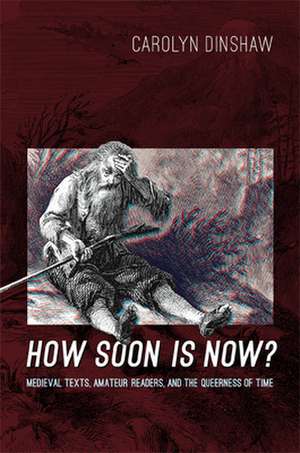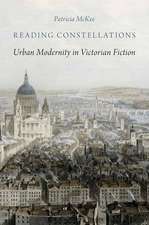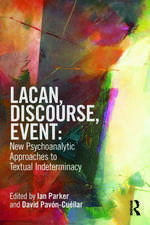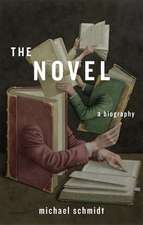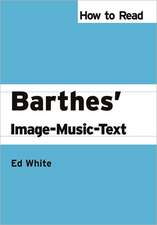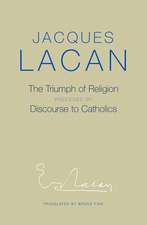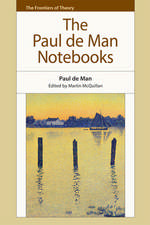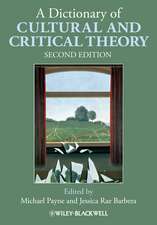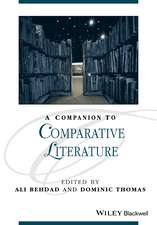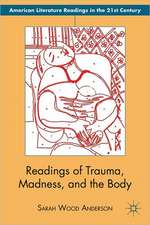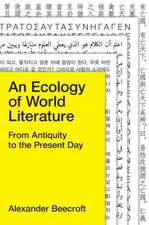How Soon Is Now? – Medieval Texts, Amateur Readers, and the Queerness of Time
Autor Carolyn Dinshawen Limba Engleză Paperback – 13 dec 2012
Preț: 215.27 lei
Nou
Puncte Express: 323
Preț estimativ în valută:
41.20€ • 44.73$ • 34.61£
41.20€ • 44.73$ • 34.61£
Carte disponibilă
Livrare economică 01-15 aprilie
Livrare express 18-22 martie pentru 25.71 lei
Preluare comenzi: 021 569.72.76
Specificații
ISBN-13: 9780822353676
ISBN-10: 0822353679
Pagini: 272
Ilustrații: 7 illustrations
Dimensiuni: 154 x 231 x 19 mm
Greutate: 0.36 kg
Ediția:New.
Editura: MD – Duke University Press
ISBN-10: 0822353679
Pagini: 272
Ilustrații: 7 illustrations
Dimensiuni: 154 x 231 x 19 mm
Greutate: 0.36 kg
Ediția:New.
Editura: MD – Duke University Press
Recenzii
"Entering into an elegant slipstream of generative, generous, rigorous thought, Carolyn Dinshaw proves again her exquisite power to enchant her readers. Uniquely attractive as a theorist of time, she brilliantly addresses a temporal spread, from the seeming irrationality of medieval temporality to modernity's 'stingy' outlook on the senses. As I read How Soon Is Now? I found her signal emphasesreading, temporality, non-linearity, queer historicity, and medieval mysticismmattering to me, a queer theorist and non-medievalist, in the novel ways she said they would." Kathryn Bond Stockton, author of The Queer Child, or Growing Sideways in the Twentieth Century"How do queers relate to the distant past and experience time? Carolyn Dinshaws answer to this question in How Soon is Now? ranges through astute literary criticism, cogently argued theory, and snippets of autobiography. The result is a provocative essay about the value and presence of the past that is also at times profoundly moving. Her account of the amateur scholars privileged relation to asynchrony and affective engagement with the object of study should give all in the academy pause for thought." Simon Gaunt, author of Love and Death in Medieval French and Occitan Courtly Literature: Martyrs to Love"Carolyn Dinshaw writes with love, learning, and endless good humor about asynchrony, the amateur, and the complex queerness of both. How Soon Is Now? is full of asynchrony stories, both medieval and modern, stories in which time is out of joint or so full as to be irresolvable into the the narrowly sequential conception of time that remains one of the driving engines of the heteronormative imagination. Rather than rejecting the past or the future, Dinshaw argues for the asynchrony of a now in which the very distinction between past, present, and future becomes impossible to make. In a series of beautiful and moving readings, Dinshaw makes us think about what we love. "I want more life." Who can argue with that simple but extraordinary claim?" Amy Hollywood, author of Sensible Ecstasy: Mysticism, Sexual Difference, and the Demands of History
"Entering into an elegant slipstream of generative, generous, rigorous thought, Carolyn Dinshaw proves again her exquisite power to enchant her readers. Uniquely attractive as a theorist of time, she brilliantly addresses a temporal spread, from the seeming irrationality of medieval temporality to modernity's 'stingy' outlook on the senses. As I read How Soon Is Now? I found her signal emphases - reading, temporality, non-linearity, queer historicity, and medieval mysticism - mattering to me, a queer theorist and non-medievalist, in the novel ways she said they would." Kathryn Bond Stockton, author of The Queer Child, or Growing Sideways in the Twentieth Century "How do queers relate to the distant past and experience time? Carolyn Dinshaw's answer to this question in How Soon is Now? ranges through astute literary criticism, cogently argued theory, and snippets of autobiography. The result is a provocative essay about the value and presence of the past that is also at times profoundly moving. Her account of the amateur scholar's privileged relation to asynchrony and affective engagement with the object of study should give all in the academy pause for thought." Simon Gaunt, author of Love and Death in Medieval French and Occitan Courtly Literature: Martyrs to Love "Carolyn Dinshaw writes with love, learning, and endless good humor about asynchrony, the amateur, and the complex queerness of both. How Soon Is Now? is full of asynchrony stories, both medieval and modern, stories in which time is out of joint or so full as to be irresolvable into the the narrowly sequential conception of time that remains one of the driving engines of the heteronormative imagination. Rather than rejecting the past or the future, Dinshaw argues for the asynchrony of a now in which the very distinction between past, present, and future becomes impossible to make. In a series of beautiful and moving readings, Dinshaw makes us think about what we love. "I want more life." Who can argue with that simple but extraordinary claim?" Amy Hollywood, author of Sensible Ecstasy: Mysticism, Sexual Difference, and the Demands of History
"Entering into an elegant slipstream of generative, generous, rigorous thought, Carolyn Dinshaw proves again her exquisite power to enchant her readers. Uniquely attractive as a theorist of time, she brilliantly addresses a temporal spread, from the seeming irrationality of medieval temporality to modernity's 'stingy' outlook on the senses. As I read How Soon Is Now? I found her signal emphases - reading, temporality, non-linearity, queer historicity, and medieval mysticism - mattering to me, a queer theorist and non-medievalist, in the novel ways she said they would." Kathryn Bond Stockton, author of The Queer Child, or Growing Sideways in the Twentieth Century "How do queers relate to the distant past and experience time? Carolyn Dinshaw's answer to this question in How Soon is Now? ranges through astute literary criticism, cogently argued theory, and snippets of autobiography. The result is a provocative essay about the value and presence of the past that is also at times profoundly moving. Her account of the amateur scholar's privileged relation to asynchrony and affective engagement with the object of study should give all in the academy pause for thought." Simon Gaunt, author of Love and Death in Medieval French and Occitan Courtly Literature: Martyrs to Love "Carolyn Dinshaw writes with love, learning, and endless good humor about asynchrony, the amateur, and the complex queerness of both. How Soon Is Now? is full of asynchrony stories, both medieval and modern, stories in which time is out of joint or so full as to be irresolvable into the the narrowly sequential conception of time that remains one of the driving engines of the heteronormative imagination. Rather than rejecting the past or the future, Dinshaw argues for the asynchrony of a now in which the very distinction between past, present, and future becomes impossible to make. In a series of beautiful and moving readings, Dinshaw makes us think about what we love. "I want more life." Who can argue with that simple but extraordinary claim?" Amy Hollywood, author of Sensible Ecstasy: Mysticism, Sexual Difference, and the Demands of History
Notă biografică
Carolyn Dinshaw is Professor of English, and Social and Cultural Analysis at New York University. She is the author of "Getting Medieval: Sexualities and Communities, Pre- and Postmodern," also published by Duke University Press, and "Chaucer's Sexual Poetics." Dinshaw is a founding coeditor of "GLQ: A Journal of Lesbian and Gay Studies."
Cuprins
Descriere
Performs a powerful critique of modernist temporal regimes through its revelatory exploration of queer ways of being in time
